Multiple Myeloma (MM) is the second most common hematological malignancy that originates from plasma cells. Over the last 20 years, treatment for patients of MM has advanced significantly; but despite best efforts, a cure for the disease is still yet to be found.
By introducing proteasome inhibitors and immunomodulatory drugs, the effectiveness of treatment has improved remarkably, with the median overall survival (mOS) increasing from 2 years to 5-6 years.
Commencing in 2012, the MM treatment piloted in innovations, bringing new formulations of the original drugs, CAR-T cell therapies, as well as ADC and antibody drugs.
At present, the most widely researched monoclonal antibody for MM targets CD38. However, newer developments of bispecific antibodies that target CD38/CD3 are in the pipeline – taking full advantage of recent breakthrough studies.2
Why choose CD38 target to treat MM?
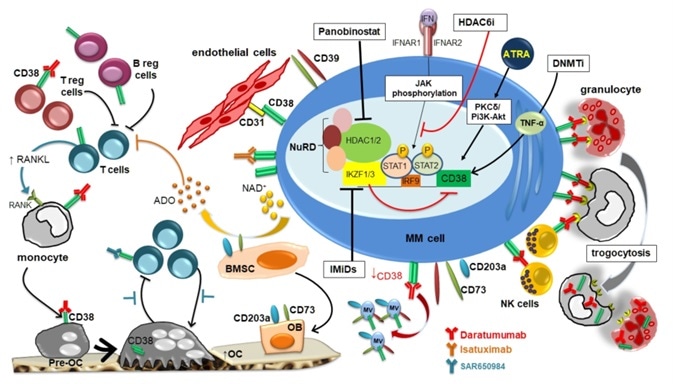
The expression and mechanism of CD38 in MM microenvironment [1]. Image Credit: ACROBiosystems
CD38 is widely targeted in MM immunotherapy due to its multiple mechanisms of action and highly specific expression.
CD38 is generally expressed in plasma cells but is highly expressed on the surface of MM cells. Behaving like a metabolic sensor, CD38 can detect high concentrations of NAD+ in the bone marrow microenvironment.
As an extracellular enzyme, CD38 can then catalyze the cleavage of NAD+ into cyclic adenosine diphosphate ribose (cADPR).
Additionally, CD38 catalyzes the production of NAADP, cADPR and NAADP by cation exchange catalyzing nicotinamide adenine dinucleotide (NADP) as a "secondary messenger".
This triggers the release of intracellular calcium ions and promotes the synthesis of adenosine (ADO) in the bone marrow microenvironment. As a result, CD38 is an excellent therapeutic target as it allows immune escape and is closely involved in MM cell growth.
Daratumumab is the first monoclonal antibody that targets CD38. It exhibits good therapeutic efficacy for MM as a single agent, as well as when combined with normal standard-of-care regimens. Despite this, many patients relapse due to resistance mechanisms.
These mechanisms include FcγR-dependent downregulation of CD38 on tumor cells, as well as inhibition of complement-dependent cytotoxicity (CDC), antibody-dependent cellular phagocytosis (ADCP) and antibody-dependent cell-mediated cytotoxicity (ADCP) mechanisms.
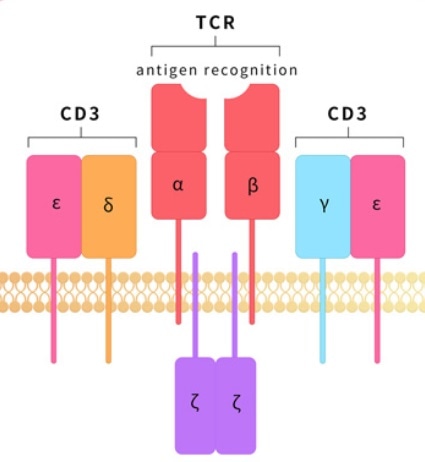
CD3 proteins are hot targets for bispecific antibodies. Image Credit: ACROBiosystems
A new class of bispecific antibodies, bispecific T-cell engagers (BiTEs), have a mechanism of action that recognizes specific target antigens on the surface of tumor cells, whilst simultaneously targeting CD3E&CD3D or CD3E&CD3G heterodimer molecules on T cells.
BiTEs recruit T cells to the location of the target cells; here, they exert T cell-mediated cytotoxicity, which ultimately induces tumor cell death.
Table 1. Bispecific antibodies targeting CD38/CD3 to treat MM. Source: ACROBiosystems
| Drug Name |
Company |
Research Phase |
| AMG-424 |
Amgen |
Phase I clinical trial |
| GBR-1342 |
Glenmark |
Phase I clinical trial |
| Y-150 |
YZY Biopharma |
Phase I clinical trial |
Currently, there are three CD38/CD3-targeting BiTEs to treat MM – all of which are in phase I clinical trials.
It was recently shown that an anti-CD38 bispecific antibody, AMG424, was able to eliminate MM cells during preclinical models, as well as trigger “off-tumor” T-cell cytotoxicity on B, T and NK cells in-vitro.
New breakthroughs of CD38/CD3 in MM
During a recent study, researchers developed a new CD38/CD3 specific antibody (Bi38-3) based upon BiTEs design.2
The researchers found that purified Bi38-3 specifically and efficiently recognizes CD38 on MM cells and bound to CD3 on T cells. The results suggest that Bi38-3 does not impair the surface expression of CD38.
Additionally, Bi38-3 only triggers T-cell-mediated killing of cells that are expressing high levels of CD38 whilst having no or limited toxicity against cells expressing intermediate levels of CD38, such as B, T and NK cells, or hematopoietic progenitors.
At low concentrations (10-2 ng/mL and above), Bi38-3 readily induced MM cell death whilst avoiding triggering significant T cell-mediated cytotoxicity to Foxp3+ regulatory T cells.
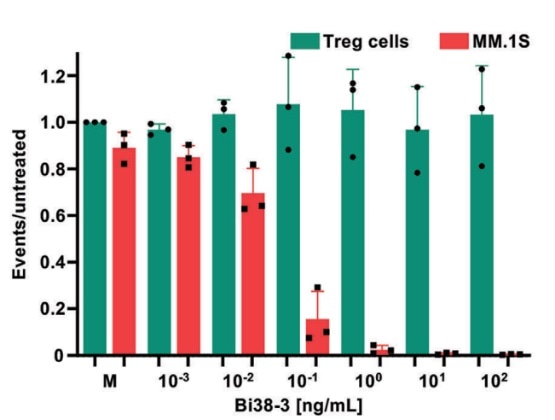
Image Credit: ACROBiosystems
Likewise, when the concentration is less than 10 ng/mL, there is no significant toxicity to CD34+ hematopoietic progenitor cells.
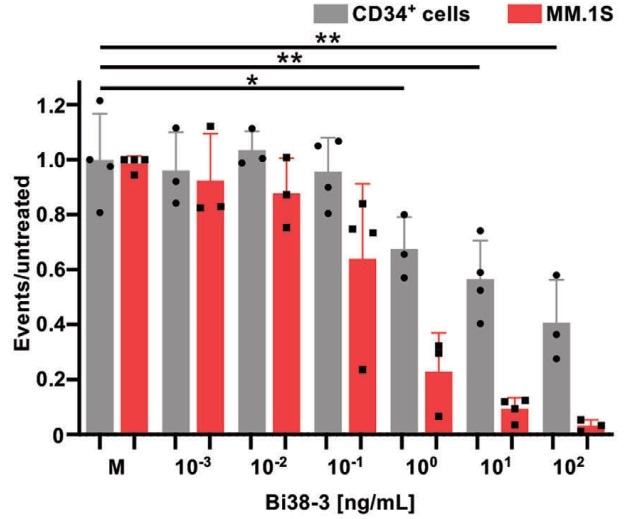
Image Credit: ACROBiosystems
Even at its highest concentration, the toxicity to CD34+ hematopoietic progenitor cells is only moderate (>40% survival). This study suggests that Bi38-3 may have greater efficacy than alternative specific antibodies that have been developed which also target CD38/CD3.
Most significantly, Bi38-3 can efficiently trigger the killing of MM cells in patients who would otherwise be resistant to standard treatments.
In addition, it is expected that Bi38-3 is efficient in patients that relapse following daratumumab therapy; this is because Bi38-3 recognizes a specific epitope on CD38 and lacks the Fc region.
Despite these encouraging results, further investigation is required to determine whether the Bi38-3 in this study can be used as a front-line agent (alone or in combination with other drugs) for MM patients.
However, this research confidently concludes that with continuing advancements in research, immunotherapy for MM will one day become a cure.
To fast-track the research and development of bispecific antibodies, ACROBiosystems offers a series of high-quality CD3 proteins with the following five advantages:
Larger product catalog
- 44 full range of CD3 proteins: CD3 delta (CD3δ), CD3 epsilon (CD3ε), CD3 gamma (CD3γ), CD3E&CD3G (CD3ε& CD3γ), CD3E&CD3D (CD3ε& CD3δ).
- Various tags: Flag, his, his&Avi, Fc, Llama Fc.
- Various species: Human, Rat, Mouse, Cynomolgus, Rabbit.
Homogeneous structure
It has been proven that CD3E&CD3G and CD3E&CD3D are 1:1 heterodimers verified by non-reductive electrophoresis and MALS.
For instance, the purity of Human CD3E&CD3D Heterodimer Protein, His Tag&Tag Free (Cat. No. CDD-H52W1) is more than 90% verified by SEC-MALS.
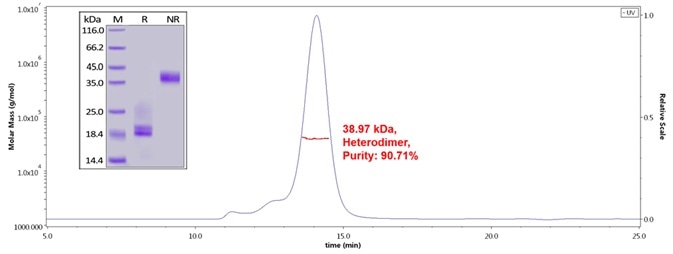
Image Credit: ACROBiosystems
High batch-to-batch consistency
CD3 proteins are under stringent quality controls, guaranteeing minimal batch-to-batch differences, for example, low deviations between different batches of CD3E&CD3D (Cat. No. CDD-H52W1) as confirmed by ELISA.
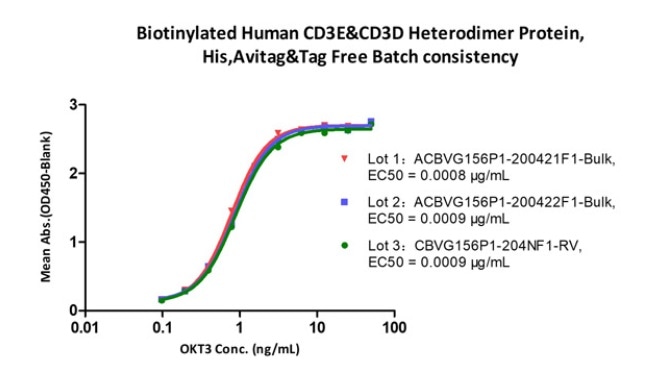
Image Credit: ACROBiosystems
High bioactivity, in line with drug development requirements
The high bioactivity of CD3 proteins can be confirmed by combining with common antibodies such as SP34-2, OKT3, BCMA×CD3 and UCHT1.
For example, biotinylated Human CD3E&CD3D heterodimer protein (Cat. No. CDD-H82W6) can specifically bind bispecific BCMA×CD3 T cell-engaging antibody with a sensitivity of 15 ng/mL.
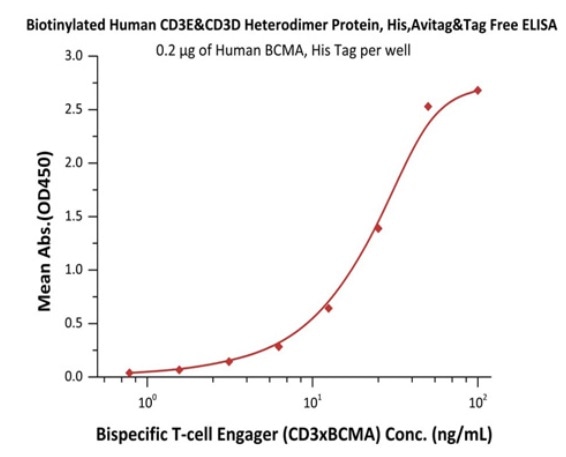
Image Credit: ACROBiosystems
Suitable for different applications in drug development
CD3 proteins can be used for an array of applications during the various stages of drug development, such as biopanning, antibody immunotiter detection, antibody screening, clinical pharmacokinetic assays and affinity characterization.
For instance, CD3E&CD3D heterodimer protein (Cat. No.CDD-H52W1) can specifically bind CD3 X BCMA with an affinity constant of 31.8 nM as determined in the SPR assay (Biacore T200).
ACROBiosystems offer CD38 target proteins from a variety of species (Human/Cynomolgus/Mouse) and with a variety of tags (His/Avi His/Fc) that support different applications in drug development.
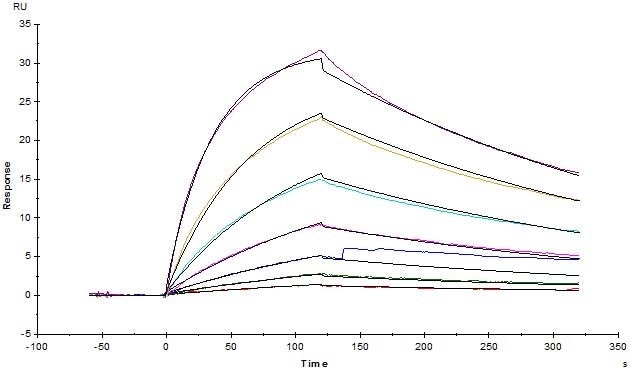
Image Credit: ACROBiosystems
Table 2. Product list - Hot CD3. Source: ACROBiosystems
| Molecule |
Cat. No. |
Product Description |
Tag |
| CD3E & CD3D |
CDD-H5255 |
Human CD3 epsilon&CD3 delta Heterodimer Protein, Fc Tag&Fc Tag (MALS verified) |
C-Fc | C-Fc |
| CDD-H52W1 |
Human CD3 epsilon & CD3 delta Heterodimer Protein, His Tag&Tag Free (MALS verified) |
C-8×His | Native |
| CDD-H82W6 |
Biotinylated Human CD3 epsilon&CD3 delta Heterodimer Protein, His, Avitag™&Tag Free (MALS verified) |
C-10×His & C-Avi | Native |
| CDD-H52W0 |
Human CD3 epsilon&CD3 delta Heterodimer Protein, Fc, His Tag&Fc, Flag Tag (MALS verified) |
C-Fc & C-6×His | C-Fc & C-Flag |
| CD3E & CD3G |
CDG-H5253 |
Human CD3 epsilon&CD3 gamma Heterodimer Protein, Fc Tag&Fc Tag (MALS verified) |
C-Fc | C-Fc |
| CDG-H52W9 |
Human CD3 epsilon&CD3 gamma Heterodimer Protein, Fc, His Tag&Fc, Flag Tag (MALS verified) |
C-Fc & C-6×His | C-Fc & C-Flag |
| CD3 epsilon |
CDE-H5223 |
Human CD3 epsilon Protein, His Tag (MALS verified) |
C-10×His |
Table 3. Product list - CD38 with high purity and bioactivity. Source: ACROBiosystems
| Cat. No. |
Product Description |
Tag |
| CD8-H5224 |
Human CD38 Protein, His Tag (MALS verified) |
His |
| CD8-H82E7 |
Biotinylated Human CD38 Protein, Avitag™, His Tag |
Avi, His |
| CD8-H5255 |
Human CD38 Protein, Fc Tag (MALS verified) |
Fc |
| CD8-H5253 |
Human CD38 Protein, Mouse IgG2a Fc Tag, low endotoxin |
Fc |
| CD8-H5252 |
Human CD38 Protein, Llama IgG2b Fc Tag, low endotoxin |
Fc |
| CD8-C5223 |
Cynomolgus CD38 Protein, His Tag |
His |
| CD8-M5223 |
Mouse CD38 Protein, His Tag |
His |
| CD8-HF255 |
FITC-Labeled Human CD38 Protein, Fc Tag |
Fc |
| CD8-HF2H5 |
FITC-Labeled Human CD38 Protein, His Tag |
His |
Partial verification data of CD38
The purity of Human CD38, His Tag (Cat. No.CD8-H5224) is more than 95%, with a molecular weight of around 35-45 kDa – verified by SEC-MALS.
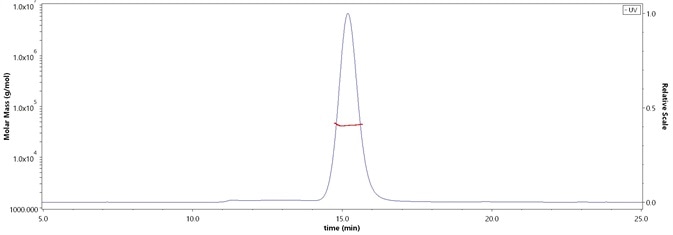
Image Credit: ACROBiosystems
High bioactivity of Human CD38 (Cat. No. CD8-H5224) is confirmed by SPR assay that can bind anti-CD38 mAb (Human IgG1) with an affinity constant of 4.98 nM.
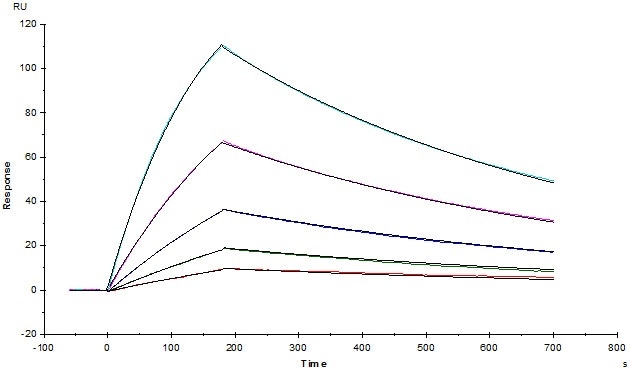
Image Credit: ACROBiosystems
References
- Federica Costa et al., CD38 Expression by Myeloma Cells and Its Role in the Context of Bone Marrow Microenvironment: Modulation by Therapeutic Agents,Cells 2019, 8 (12):1632.
- Fayon, Maxime, et al., Bi38-3 is a novel CD38/CD3 bispecific T-cell engager with low toxicity for the treatment of multiple myeloma, Haematologica, 2021, 106 (4): 1193.
About ACROBiosystems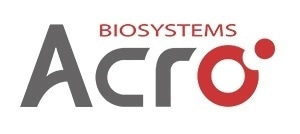
ACROBiosystems is a cornerstone enterprise of the pharmaceutical and biotechnology industries. Their mission is to help overcome challenges with innovative tools and solutions from discovery to the clinic. They supply life science tools designed to be used in discovery research and scalable to the clinical phase and beyond. By consistently adapting to new regulatory challenges and guidelines, ACROBiosystems delivers solutions, whether it comes through recombinant proteins, antibodies, assay kits, GMP-grade reagents, or custom services. ACROBiosystems empower scientists and engineers dedicated towards innovation to simplify and accelerate the development of new, better, and more affordable medicine.
Sponsored Content Policy: News-Medical.net publishes articles and related content that may be derived from sources where we have existing commercial relationships, provided such content adds value to the core editorial ethos of News-Medical.Net which is to educate and inform site visitors interested in medical research, science, medical devices and treatments.